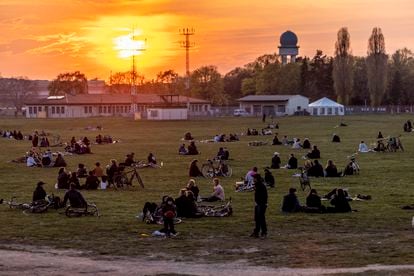A group of people enjoy the sunset in the park of Berlin's former Tempelhof airport on Wednesday, April 28. Maja Hitij / Getty Images
No sooner said than done. Germany will ease in a matter of days some restrictions for the almost 6.7 million citizens who already have the full vaccination schedule. Angela Merkel's Executive agreed it a week ago in a meeting with the leaders of the 16 federal states and this Monday her Executive has already approved it. If all goes according to plan, on Thursday and Friday the bill will pass through both legislative chambers and could enter into force on Saturday. Those vaccinated will no longer be obliged, for example, to present a negative rapid test before entering closed shops or to comply with the curfew. Furthermore, vaccinated Germans returning from abroad will not have to quarantine.
The specific details about the restrictions are still unknown, but a draft published this Monday by the daily
Bild
indicates that these will be the main measures that immunized citizens will no longer have to comply with. Merkel explained last week that studies by the scientific body that advises the government, the Robert Koch Institute (RKI), show that people who have received the two doses of the vaccines have a lower risk of infection two weeks after the last puncture. The probability that they will become seriously ill is very low; also that they can infect others. The risk to society as a whole is therefore very low, Merkel spokesman Steffen Seibert said Monday. Some of the measures that will enter into force throughout the country have been in force for a few days in some states, such as North Rhine-Westphalia.
Lifting the restrictions for a part of the population is controversial, Seibert admitted during the press conference in which the government explained its decision.
The vast majority of Germans have not yet been vaccinated, so it is a "sensitive" issue, he said.
Some voices criticize that this measure can discriminate against the young population, which cannot even be vaccinated because it is not yet allowed in their age groups.
Seibert did not want to confirm what restrictions those vaccinated would be exempted from because they are still being negotiated, he said.
According to
Bild
, those immunized could skip the night curfew, which is currently in force in areas with a cumulative incidence of more than 100 cases per 100,000 inhabitants in seven days, which is the majority.
The curfew runs from 10 p.m. to 5 a.m.
Since nonessential retail reopened last March, customers have been required to present a negative antigen test upon entry. This is another measure that those already immunized will probably not have to comply with. It would be enough to show the vaccination card, a personal document in which the date of each dose is noted. The vaccinated could also meet with each other. In most states, currently only members of a household are allowed to get together with a single person from another nucleus.
28.2% of the German population have received at least one dose, while 8% already have the full regimen and are considered to be immunized. To this number should be added just over three million people who are listed as recovered and who are likely to be equated with those immunized when it comes to relaxing the restrictions. In total, the relaxation would affect about 10 million Germans. The country is immersed in the third wave of the pandemic, but in recent days it seems to be controlling it. Daily cases plateau or decline slightly. The German Executive has not yet presented a de-escalation plan as has, for example, France.








